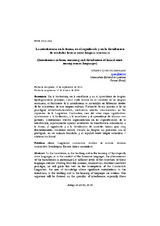La interferencia en la forma, en el significado y en la distribución de unidades léxicas entre lenguas románicas
Interference in form, meaning and distribution of lexical units among roman languages
Autor
Goes de Andrade, Otávio
Editor
UCOPressFecha
2014Materia
Lingüística contrastivaAnálisis de errores
Análisis contrastivo
Interlengua
Errores léxico-semánticos
Contrastive Linguistics
Analysis of Errors
Contrastive Analysis
Interlingua
Lexical semantic errors
METS:
Mostrar el registro METSPREMIS:
Mostrar el registro PREMISMetadatos
Mostrar el registro completo del ítemResumen
En la traducción, en la enseñanza y en el aprendizaje de lenguas tipológicamente próximas, como suele ocurrir en el contexto de las lenguas románicas, el fenómeno de la interferencia se materializa en diferentes niveles de las estructuras de esas lenguas-culturas. Partiendo de esa premisa y de un paradigma estructural-mentalista, anclaremos nuestra comunicación en los supuestos de la Lingüística Contrastiva, área del saber cuyas significativas aportaciones a la traducción, a la enseñanza y al aprendizaje de idiomas son patentes. Centraremos nuestra argumentación en las especificidades de la interferencia, especialmente aquellas resultantes de transferencia relacionadas a la forma, al significado y a la distribución de unidades léxicas que, muy frecuentemente, ocasionan errores cuando las lenguas en presencia son el portugués, en su variante brasileña, y el español como lengua extranjera / adicional en Brasil. In the translation, in the teaching and in the learning of typologically close languages, as in the context of the Romance languages, the phenomenon of the transference is materialized at different levels of the structures of those languages-cultures. Starting from this premise, nuanced by a structural-mentalist paradigm, we will guide this text on the assumptions of the Contrastive Linguistics, the area of knowledge whose significant contributions to the translation, to the teaching and to the learning of languages are evident. Our argument will be focused on the specifics of interference, especially those resulting from transferences, related to the form, to the meaning and to the distribution of lexical units that often cause errors when the languages regarded are Portuguese in its Brazilian variant, and Spanish as a foreign/additional language in Brazil.

